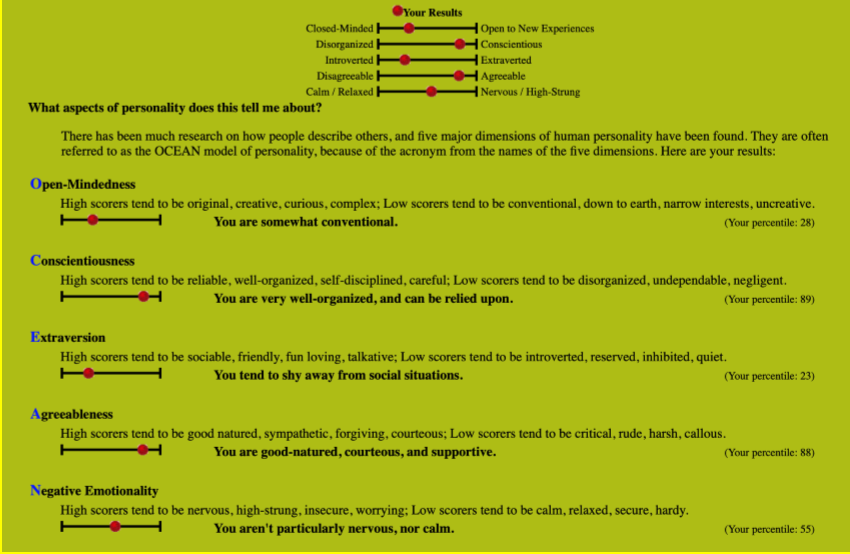The Big Five Personality Dimensions
Openness refers to one’s degree of interest in exploring new things. Open people are usually more creative, imaginative, and unconventional. Conscientiousness equals thoughtfulness and involvement in goal-oriented behaviors. Individuals with a high score in this dimension tend to be attentive to details and frequently engage in planning and scheduling activities (Cherry).
Extraversion is sociability and willingness to voice own thoughts and express emotions (Cherry). While extroverts feel comfortable around people and like to draw their attention, introverts normally socialize less and enjoy solitude. Lastly, agreeableness and neuroticism can be defined as the ability to build positive relationships with others and the magnitude of one’s emotional stability/instability. Such features characterize Agreeableness as trust, kindness, and empathy (Cherry). In its turn, neuroticism is manifested in irritability and uncontrollable mood swings (Cherry). Thus, those with high scores in the latter dimension face an increased risk of stress and anxiety.
Personal Rating
My rating in the Big Five dimensions is as follows: openness – 45, conscientiousness – 90, extraversion – 25, agreeableness – 90, and neuroticism – 50. A low score in the openness dimension is because I do not try anything new without being confident in positive outcomes. For example, after being invited to a dance class once and failing to perform well, I became extremely frustrated and felt that my time was wasted. Overall, I have a set number of interests and strive to dedicate my time to them instead of seeking experiences that may be of no benefit for me. I also prefer to organise my activities beforehand, which explains a high conscientiousness score. I regularly create daily and weekly plans and stick to them whenever I am studying, working, and so forth.
As for extraversion, I have a relatively narrow social circle and neither feel comfortable in the company of unfamiliar people, nor like to speak up in their presence. However, I am highly agreeable and treat people with kindness. I care about my close ones and even helped my cousin, both financially and emotionally, to go back to college after a long break. Lastly, I am neither high nor low in the dimension of neuroticism because the level of my anxiety depends on time and context. For instance, I noticed that I may become emotionally unstable and engage in more conflicts during exams. Nevertheless, in equally stressful situations of financial instability and health problems, I could control myself somewhat better and avoid worrying too much.
Online Test Results

Evaluation
Results of the online test match well with my personal assessment scores. I agree that I am well-organized, responsible, reserved, and good-natured. I also agree that I am more conventional than unconventional and not particularly curious about exploring new things. However, I disagree that the latter traits make me a simple and uncreative person since, as a future architect, I have to think abstractly and innovate a lot.
Personality Profile and Job Choice
It seems that a low openness score is not to my advantage as a future architect since originality and uniqueness of design are important in this profession. Nevertheless, the ability to organize the work process is also highly important in this field because architecture design is very methodological and requires scrupulous attention to details. Thus, a high conscientiousness score may be viewed as my main strength. Besides that, being an agreeable person, I will likely get along well with the members of my future work team.
Topic Content Application
I also would like to apply cognitive-social psychological models to various life situations. One of them was developed by George Kelly who suggested that individuals’ behaviors are defined by personal constructs (values, goals, and general life aspirations) (Burton et al. 705). This idea can be used to evaluate the suitability of my goals/views to the professional field of my choice or any potential future work environment. By using this theory, I will be more successful in choosing the situational/environmental factors that would be in line with my cognitive/internal factors and, thus, would lead to more rewarding experiences.
Works Cited
Burton, Lorelle, et al. Psychology. 5th ed., John Wiley & Sons Australia, 2018.
Cherry, Kendra. “The Big Five Personality Traits.” Very Well Mind, 2019.